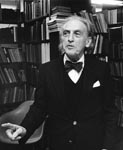The passing of a moral titan
Emeritus Philosophy Prof Raymond Klibansky dies at 99

Emeritus Professor Raymond Klibansky in 1992.
McGill Reporter
With the passing of Raymond Klibansky this month, McGill lost a professor emeritus and the world of philosophy lost an eminent scholar and moral luminary. Klibansky, who died in Montreal at the age of 99, lived a life in which ideas, world politics and friendship were closely intertwined.
When he joined McGill's Department of Philosophy in 1946, Klibansky had already been party to many of the great ideas and events of the 20th century. A Paris-born Jew, he joined the University of Heidelberg in 1923 at the age of 17 where he collaborated with the wife of Max Weber, working with her to compile a master work of the renowned sociologist. He became a professor in 1931, shortly before the Nazis' consolidation of power in Germany and their subsequent purging of Jewish academics.
Even at this young age, Klibansky distinguished himself as a scholar and a broad thinker. His work in the late 20's and 30's focused on the middle ages and on the medieval understanding of Plato. This apparently "narrow" historical interest was, though, explored in the context of much larger, contemporary questions that probed the limits of human reason and the tension between cognitive and affective capabilities.
"My ambition was to understand what it is to be human," he told Le Devoir in a 1992 interview. "And to do so required starting at the beginning, with Greek thought and Greek language – of the philosophers, but also of the poets, not to mention visual expression of spirit that can be found in art."
As Germany's political climate worsened, Klibansky became deeply dismayed by what he perceived as hypocrisy and moral vacillation on the part of Martin Heidegger and other intellectuals who professed ethical ideals, but then capitulated to Nazi ideology. He left Heidelberg in 1933 for England, convincing members of the Warburg Institute to remove the books of their celebrated library from Germany and join him in exile.
Learning English in the span of a few months, Klibansky joined the prestigious Wolfson College at Oxford where he resumed his teaching and research. When full-scale war broke out, he joined the British Army as a colonel, supplying intelligence recommendations. To do so, he drew not only upon his knowledge of Germany, but also on works of antiquity; when the American army asked him what weather to expect during the harvest in Tuscany, he turned to Virgil to provide the answer.
At the end of the war, Klibansky exchanged epaulettes for tweed once more, moving to Montreal and continuing his contributions to the intellectual universe that had been so violently shattered in Germany. The experience of his early years had made him a forceful democrat and humanist who was deeply committed to tolerance and diversity. To inform his arguments he drew on the liberal ideals of John Locke, but also on interpretations of Plato as they were filtered through centuries of scholars. In his obsequies, Quebec philosopher and long-time friend, Georges Leroux, noted that Klibansky believed philosophy was integral to resolving major political issues, from the Cold War to the East-West divide.
During his long association with McGill, Klibansky left a deep and layered impression on the Department of Philosophy. In 1964, he co-authored Saturn and Melancholy, a definitive treatment of Western perceptions on "le bonheur d'être triste." He also befriended generations of scholars, including Charles Taylor, and his commitment to varied methodologies and the history of philosophy enriched both the ideas and the library holdings of the department.
"Professor Klibansky always displayed such openness, retained a dynamic interest in the broadest range of philosophical endeavours, and always showed tremendous generosity both in his philosophical dialogue with those with whom he may not have agreed, and in his everyday dealings with students and colleagues," said current Department of Philosophy chair, Professor Philip Buckley. "Our department's continuing efforts to provide a scholarly space that is also marked by this openness is in no small measure due to the work – and personality – of Professor Klibansky."
Klibansky was well known in international circles, but also to the denizens of Montreal. He was a popular figure at the city's used book shops which he frequented, and where he was admired for his exhaustive knowledge of the philosophy and history shelves.
"He just knew everyone. He was a very quiet, soft-spoken gentle man who always had a word for everyone," said Robert Campbell, owner of the Ex Libris bookstore on Mackay Street. "I was told that he had done work on Locke because it required tolerance in order to bring various philosophic camps and philosophers together. That apparently was one of the guiding principles of his life – a belief in tolerance."

